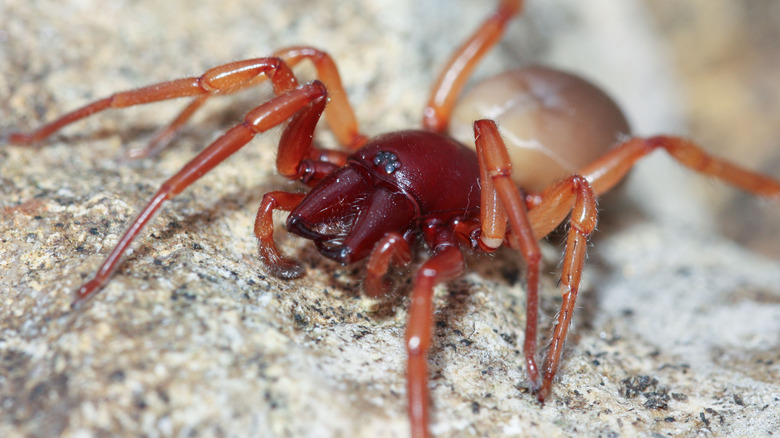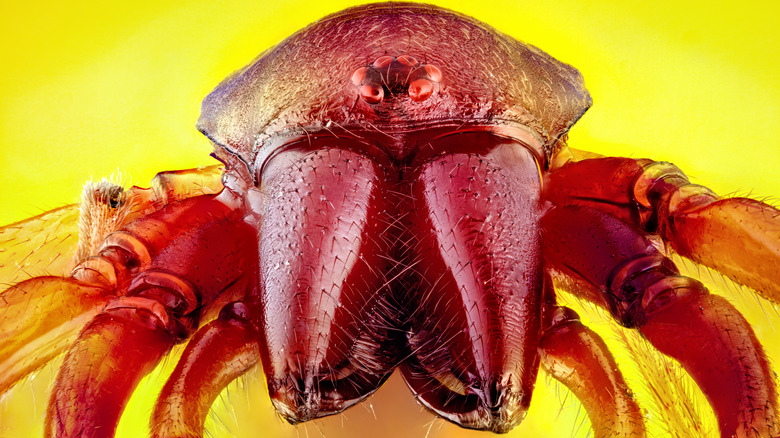Woodlouse Spider: The Common Pest That May Be Lurking In Your Basement
Moving a box in the basement of your home, you notice something scurry across the floor, dashing just out of sight. Though it may not have been very big, you noticed the strange coloring of this pest -– a dark red colored body with a larger, mahogany abdomen. It could be a woodlouse spider (Dysdera crocata) that has found its way into your home. Though it's not commonly a dangerous spider, it can be a bit scary looking and may cause some skin irritation if it happens to bite you or your child. These spiders, typically nocturnal unless you startle them, are considered household pests, meaning you'll want to determine the best way to get rid of them.
The woodlouse spider typically is between ¼ and ½ inch in size, with the female being larger than the male. They have eight long legs with an orange-to-red color, giving them a strange, nearly glowing-like appearance. You'll also notice its other prominent features, like its long fangs or the six eyes located just above those fangs. They prefer to live outdoors, usually hidden under wood piles or organic material, waiting for their prey to come close enough to kill. They may make their way into your home through cracks and crevices and ultimately could decide to stay if they find a food source. If you want to remove these spiders, there are several steps to take.
How to get rid of the woodlouse spider if you have an infestation
A significant infestation of woodlouse spiders is not unheard of, often due to the easy access the pests may have to enter your home. This most commonly happens in colder weather, as the spiders work to find their way into a warmer location to overwinter. If you live in colder areas of the country, this is more likely to happen than those who live in the south.
You can call a local pest control company to help you with removing these spiders from your home. This is an important consideration when you have a significant infestation. However, there are a few other methods you can try first if you're willing to take on those beady eyes and menacing fangs. If you see the spiders, you can vacuum them and move them outdoors. You can also use pesticides and insecticides that are designed to treat spiders as a way to remove these pests from your home. Spider traps can also work well to capture these critters so you can remove them from your home. You can also use natural pest control methods if you don't want toxic pesticides in your home. For example, you can use peppermint oil or vinegar as natural repellants. Try putting a few drops of essential oils into a bottle of water. Shake and apply this solution in areas where you've seen the spiders to ward them off.
Preventing woodlouse spiders from entering your home
It's much easier to prevent and repel woodlouse spiders than to deal with their presence. There are several simple things you can do to reduce your risk, starting with outdoors. Remove mulch and wood piles near your home. Since the main food source for these spiders is woodlice, getting rid of that pest can help to minimize the desirability of your home to the spiders. These spiders also like to be around moisture and clutter since they enjoy hiding from their prey until they are ready to attack them.
You'll also want to look for ways into your home through openings and cracks around your basement, including small cracks in the siding and small holes in the foundation. Seal these off to prevent the pests from getting into your home. Also, take the time to really clean up the area around your home's exterior and in the basement around the exterior walls. Clutter provides a hiding space and the ideal nesting area for these spiders to thrive. Also, consider a few natural woodlouse spider repellents. Add diatomaceous earth to the exterior of your home and into cracks near cabinetry or other difficult areas to access to seal. You can also add rosemary, peppermint plants, lavender, or other strong-smelling, spider-repelling plants around your home. The spiders don't like the smell and will likely move away from these areas.


